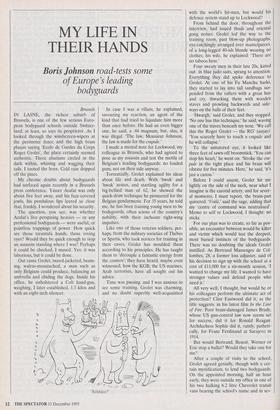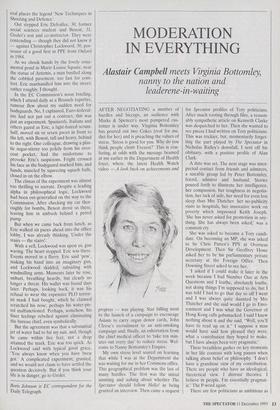MY LIFE IN THEIR HANDS
Boris Johnson road-tests some
of Europe's leading bodyguards
Brussels IN LASNE, the richest suburb of Brussels, is one of the few serious Euro- pean bodyguard schools outside Switzer- land; at least, so says its proprietor. As I looked through the windscreen-wipers at the perimeter fence and the high brass plaque saying `Ecole de Gardes du Corps Roger Grolet', the place certainly seemed authentic. Three alsatians circled in the dark within, whining and wagging their tails. I tooted the horn. Cold rain dripped off the pines.
My chronic doubts about bodyguards had surfaced again recently in a Brussels press conference. Yasser Arafat was only about five feet away, and his fuzz-covered jowls, his pendulous lips leered so close that, frankly, I wondered about his security.
The question, you see, was whether Arafat's five perspiring heavies — or any professional bodyguards — were useful, or pointless trappings of power. How quick are those tarantula hands, those roving eyes? Would they be quick enough to stop an assassin standing where I was? Perhaps it could be checked, I mused. Yes: it was laborious, but it could be done.
Out came Grolet, tweed-jacketed, beam- ing, walrus-moustached, a man such as only Belgium could produce, balancing an umbrella and chiding the dogs. Inside his office, he unholstered a Colt hand-gun, weighing, I later established, 1.5 kilos and with an eight-inch silencer. In case I was a villain, he explained, savouring my reaction, an agent of the kind that had tried to liquidate him more than once before, He had an even bigger one, he said, a .44 magnum, but, alas, it was illegal. 'The law, Monsieur Johnson, the law is made for the crapule.'
I made a mental note for Lockwood, my colleague in Brussels, who had agreed to pose as my assassin and test the mettle of Belgium's leading bodyguards: no loaded guns, not on their side anyway.
Torrentially, Grolet explained his ideas about life and death. With `hwuk' and %wok' noises, and startling agility for a big-bellied man of 62, he showed the quick-draw technique he pioneered for the Belgian gendarmerie. For 35 years, he told me, he has been training young men to be bodyguards, often scions of the country's nobility, with their inchoate right-wing impulses.
Like one of those veteran soldiers, per- haps, from the military societies of Thebes or Sparta, who took novices for training in their caves, Grolet has moulded them according to his principles. He has taught them to `decouple a fantastic energy from the cosmos'; they have heard, maybe even witnessed, how the KGB, the US marines, Arab terrorists, have all sought out his advice.
Time was passing, and I was anxious to see some training. Grolet was charming, and no doubt superbly well-acquainted `Nibbles?' with the world's hit-men, but would his defence system stand up to Lockwood?
From behind the door, throughout the interview, had issued thuds and oriental gong noises. Grolet led the way to the training room, past blow-up photographs, eye-catchingly arranged over mantelpieces, of a long-legged 40-ish blonde wearing no clothes; his wife, he explained: 'There are no taboos here.'
Four sweaty men in their late 20s, kitted out in blue judo suits, sprang to attention. Everything they did spoke deference to Grolet. At one of his Fu Manchu barks, they started to lay into tall sandbags sus- pended from the rafters with a great hue and cry, thwacking them with wooden staves and prowling backwards and side- ways on the balls of their feet.
`Hwargh,' said Grolet, and they stopped. `No one has this technique,' he said, waving one of the staves beneath my nose. 'We call this the Roger Grolet — the RG' (airjay). `You scarcely have to touch a crapule and he will collapse.'
To the untutored eye, it looked like three feet of sawn-off broomstick. 'You can stop his heart,' he went on. 'Stroke the cra- pule in the right place and his brain will vibrate for five minutes. Here,' he said, it's just a caress.'
Before I could assent, Grolet hit me lightly on the side of the neck, near what I imagine is the carotid artery, and for sever- al moments, I must report, the brain-pan quivered. Voila,' said the sage, adding that my 'centre of command was neutralised'. Memo to self re Lockwood, I thought: no sticks.
For our plan was to create, so far as pos- sible, an encounter between would-be killer and victim which would test the deepest, most buried instincts of the bodyguards. There was no doubting the ideals Grolet instilled. As Bertrand Massenges de Col- lombes, 28, a former loss adjuster, said of his decision to sign up with the school at a cost of £11,000 for a six-month session, 'I wanted to change my life. I wanted to have stronger values and defend people who need it.'
All very well, I thought, but would he or his colleagues perform the ultimate act of protection? Clint Eastwood did it, as the title suggests, in his latest film In the Line of Fire. Poor brain-damaged James Brady, whose US gun-control law now seems set for success, did it for Ronald Reagan. Archduchess Sophie did it, vainly, patheti- cally, for Franz Ferdinand at Sarajevo in 1914.
But would Bertrand, Benoit, Werner or Eric stop a bullet? Would they take one for me?
After a couple of visits to the school, Grolet agreed genially, though with a cer- tain mystification, to lend two bodyguards. On the appointed morning, half an hour early, they were outside my office in one of his two hulking 6.2 litre Chevrolet transit vans bearing the school's name and in sev. eral places the legend 'New Techniques in Shooting and Defence'.
Out stepped Eric Delvallee, 30, former social sciences student and Benoit, 31, Grolet's son and co-instructor. They were contending — though they did not know it — against Christopher Lockwood, 30, pos- sessor of a good first in PPE from Oxford in 1984.
As we shook hands by the lovely orna- mental pond in Marie-Louise Square, near the statue of Artemis, a man bustled along the cobbled pavement, too fast for com- fort. Eric manhandled him into the street; rather roughly, I thought. In the EC Commission's noon briefing, which I attend daily as a Brussels reporter, rumour flew about my sudden need for bodyguards. No, I explained, Euro-federal- ists had not put out a contract, this was just an experiment. Spaniards, Italians and others gazed as Eric, a light-haired scrum- half, moved six or seven paces in front to the left, with Benoit, tall and heavy, behind to the right. One colleague, drawing a plas- tic sugar-stirrer too jerkily from his over- coat pocket, had the misfortune to provoke Eric's suspicions. Fright crossed his face as the bodyguard marked him, and hands, muscled by squeezing squash balls, closed in on the elbow.
The climax of the experiment was almost too thrilling to narrate. Despite a leading alpha in philosophical logic, Lockwood had been out-generalled on the way to the Commission. After checking my car thor- oughly for bombs, Benoit drove us there, leaving him in ambush behind a petrol pump. But when we came back from lunch, as Eric walked six paces ahead into the office lobby, I was already thinking. Under the stairs — the stairs!.
With a yell, Lockwood was upon us, gun waving. The heart stopped. Eric was there. Events moved in a flurry. Eric said 'pow', making his hand into an imaginary gun, and Lockwood skidded, subsiding with windmilling arms. Moments later he rose, unhurt, breathing heavily, but clearly no longer a threat. His wallet was found days later. Perhaps, looking back, it was his refusal to wear the expensive PLO terror- ist mask I had bought, which he claimed scratched his nose; perhaps his water-pis- tol malfunctioned. Perhaps, somehow, his finer feelings rebelled against eliminating the bureau chief, even symbolically.
But the agreement was that a substantial jet of water had to hit my suit, and, though he came within five feet, not a drop attained the mark. Eric was too quick. As Lockwood said with typical good grace, `You always know when you have been got.' A complicated experiment, granted, and we would not claim to have settled the question decisively. But if you think your life is in danger, go to Grolet.
Boris Johnson is EC correspondent for the Daily Telegraph.



































































 Previous page
Previous page